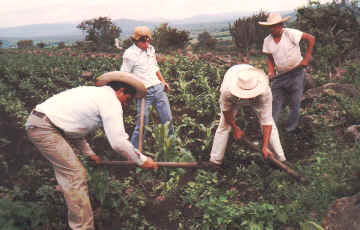Theoretical Perspectives
 Various theoretical paradigms emerged during the 1970s in anthropology and other disciplines to explain uneven development. But much of what anthropologists had to say then was based on their beginning to pay some attention to debates about capitalist development that had actually begun long before the Second World War, outside anthropology, and indeed, academia as we now know it. Professional anthropologists were late-comers to these debates because they had been focused initially on Eastern and Western Europe. One of the central issues became why peasant farmers seemed to be hanging in there despite the growth of cities and industrial production, and why peasant agriculture hadn’t been universally replaced by wage-labour based capitalist farming. In discussing this issue in the 1970s, scholars found it useful to turn back to a debate on the future of peasant agriculture that had raged in both Germany and Soviet Russia in the first two decades of the 20th century. The key figures in this debate are Lenin, the Bolshevik leader, Kautsky, a German socialist, and Chayanov, a Russia agronomist.
Various theoretical paradigms emerged during the 1970s in anthropology and other disciplines to explain uneven development. But much of what anthropologists had to say then was based on their beginning to pay some attention to debates about capitalist development that had actually begun long before the Second World War, outside anthropology, and indeed, academia as we now know it. Professional anthropologists were late-comers to these debates because they had been focused initially on Eastern and Western Europe. One of the central issues became why peasant farmers seemed to be hanging in there despite the growth of cities and industrial production, and why peasant agriculture hadn’t been universally replaced by wage-labour based capitalist farming. In discussing this issue in the 1970s, scholars found it useful to turn back to a debate on the future of peasant agriculture that had raged in both Germany and Soviet Russia in the first two decades of the 20th century. The key figures in this debate are Lenin, the Bolshevik leader, Kautsky, a German socialist, and Chayanov, a Russia agronomist.
Classical Marxism & The Agrarian Question
Introduction
Marx
Lenin
Lenin's Junker Road
Peasant Differentiation
The Chayanovian Alternative
The Family Labour Farm
Peasant Needs and Dilemmas
A Different Economic Logic
Lenin v Chayanov
Vertical Concentration
Beyond the Classical Debates
The Changing Character of the Peasantry
The Future of the Family Farm
The Global Food System
Rural Futures


 Various theoretical paradigms emerged during the 1970s in anthropology and other disciplines to explain uneven development. But much of what anthropologists had to say then was based on their beginning to pay some attention to debates about capitalist development that had actually begun long before the Second World War, outside anthropology, and indeed, academia as we now know it. Professional anthropologists were late-comers to these debates because they had been focused initially on Eastern and Western Europe. One of the central issues became why peasant farmers seemed to be hanging in there despite the growth of cities and industrial production, and why peasant agriculture hadn’t been universally replaced by wage-labour based capitalist farming. In discussing this issue in the 1970s, scholars found it useful to turn back to a debate on the future of peasant agriculture that had raged in both Germany and Soviet Russia in the first two decades of the 20th century. The key figures in this debate are Lenin, the Bolshevik leader, Kautsky, a German socialist, and Chayanov, a Russia agronomist.
Various theoretical paradigms emerged during the 1970s in anthropology and other disciplines to explain uneven development. But much of what anthropologists had to say then was based on their beginning to pay some attention to debates about capitalist development that had actually begun long before the Second World War, outside anthropology, and indeed, academia as we now know it. Professional anthropologists were late-comers to these debates because they had been focused initially on Eastern and Western Europe. One of the central issues became why peasant farmers seemed to be hanging in there despite the growth of cities and industrial production, and why peasant agriculture hadn’t been universally replaced by wage-labour based capitalist farming. In discussing this issue in the 1970s, scholars found it useful to turn back to a debate on the future of peasant agriculture that had raged in both Germany and Soviet Russia in the first two decades of the 20th century. The key figures in this debate are Lenin, the Bolshevik leader, Kautsky, a German socialist, and Chayanov, a Russia agronomist.